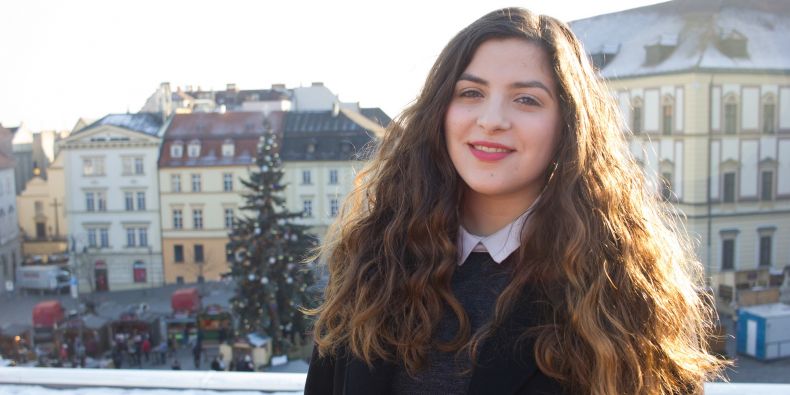Marita Georgiou from Cyprus has only good things to say about Brno. Now a final year med student at the Faculty of Medicine, her move to Brno was inspired by recommendations from her mother, who also earned her degree in the Czech Republic and praised the local high standards of education. Nevertheless, she does not plan to stay, mainly due to her insufficient knowledge of Czech.
The start of her student life in Brno was a difficult time for Marita. “It was the first time I’d ever been so far from home. I had to get used to a different teaching system, and on top of that, to being taught in English. But if you really want to become a doctor, nothing will stop you and your discipline and commitment will help you overcome any obstacles. It’s hard work that doesn’t get easier, but you get stronger. That’s my motto,” says Marita optimistically.
Becoming a doctor is her childhood dream. “I’m fascinated by the chance to help other people. This is not always about medicine. Any help is worth the smile you get or the relief you give to the other person,” she says, explaining her motives.
When comparing Czech and Cypriot education, Marita thinks the biggest difference is in the relationships between the students and the teachers. “In Cyprus, the teacher-student relationship is more personal. Here, I had to get used to being on my own although I could always ask anything during the teachers’ office hours and the teachers helped me a lot, especially in the beginning,” recalls Marita.
Brno is great: it only lacks the sea
Marita likes Brno because of its size. It’s not too small and not too big, and in her opinion, it provides students with everything they need. She was also pleasantly surprised by the diversity of the local multicultural community and she enjoys Brno’s convenient location: “It really is a city in the heart of Europe, which makes it particularly easy to travel to the surrounding countries.”
Marita says that during her almost six years in Brno, the regional capital has changed a lot. “There’s new building constructions, new restaurants and cafés, and new shops. The inflow of foreigners is also steadily increasing. It’s a very progressive city, which, nevertheless, maintains its character. All the foreign students love Brno and hold it dear to their hearts,” says Marita passionately and laughs as she immediately adds that she misses Cypriot food and the sea.
The local weather also took a bit of getting used to. “Czechia is much colder than Cyprus. But the buildings are ready for the weather and it’s warm inside; back home in Cyprus, we wouldn’t be able to deal with it,” she laughs.
The Czech language represents yet another struggle: “My native language is Greek, so Czech is a very foreign language for me. Ever since the beginning, I’ve been struggling to keep pace with the demands of the study of medicine and those of studying a new language, which I need to participate in hospital training. While I’m not giving my all to learn the language, mastering Czech isn’t an impossible task.”
The main cultural difference is in religion: “Very few Czechs that I’ve met are religious, while the opposite is true of Cyprus,” says Marita.
Older people are distrustful of foreigners
Even though Marita didn’t experience any cultural shock after her arrival, the Czech culture is unusual for her. “The main difference is in religion. Very few Czechs that I’ve met are religious, while the opposite is true of Cyprus.” She was also surprised at the amount of alcohol that Czechs can stomach.
“We are also different in our relationships to other people,” says Marita. As she describes her experience, “In a way, us Cypriots are more open. With Czechs, it very much depends on age. The older generation is not happy to see so many foreigners here. I’ve noticed significant differences in how they treat foreigners and locals. Younger people are more approachable.” She adds, “What I like is that when a Czech person says they are your friend, it really means something. Czechs can be very nice people. They respect other people’s values and principles and they are sympathetic and honest.”
Despite her positive attitude to Brno and to Czechs, Marita doesn’t plan to stay in the Czech Republic after graduating. “I haven’t learnt Czech well enough to be able to stay. I can’t rule out going back to Cyprus, but I probably won’t. There are not enough opportunities for me to become the best I can. Ideally, I’d go to Canada or the UK. I’d like to start working on my speciality, keep working on myself, and expand my horizons,” says the future doctor about her plans.
